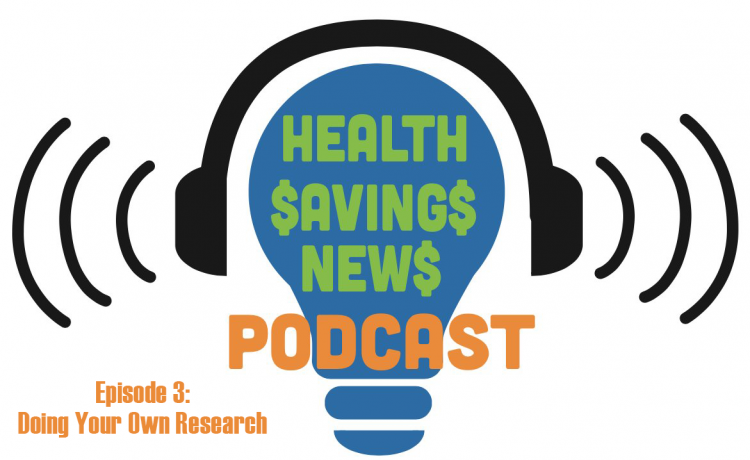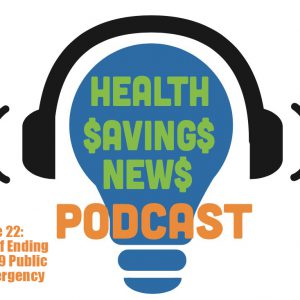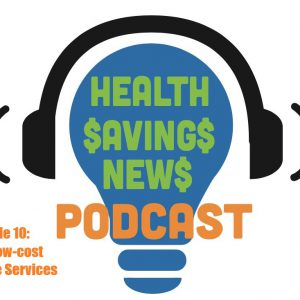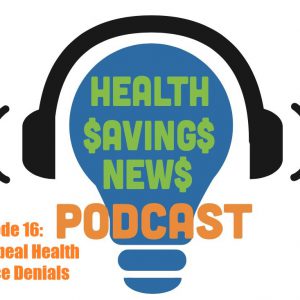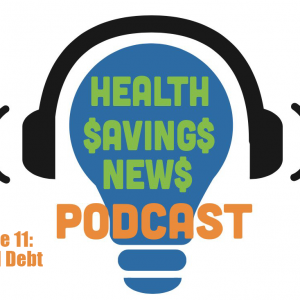This a transcript to episode 3 of Health Savings News. In the interest of making the podcast more accessible, we will post transcripts every two weeks as episodes release.
Evan (00:09):
Hello, and welcome to Health Savings News: the podcast about healthcare costs in America and how to save money on the often expensive care all kinds of people need. I’m your host, Evan O’Connor, joined by retired doctors, Rich Sagall and Mike Woods. Just to note, Rich is feeling under the weather this week so he may not speak that much, has a bit of a frog in his throat. Also, we did have some technical difficulties recording this episode. You will hear some minor sound artifacts, maybe some differences in the quality at different points. And, final note: this is the first episode we have recorded since launching the podcast, so we would like to thank everybody who’s listened so far. Some of the podcasts you’ve listened to in the past and will listen to in the future were recorded weeks if not months ago. We just want to keep these topics as evergreen as possible. This episode was recorded and we felt it was important to release it as soon as possible.
Each episode we discuss healthcare costs in America, offer tips for saving money and relevant news that affects and reflects the expensive landscape of healthcare in the United States. Today’s topic is doing your own research. The first thing we want to address for today’s topic is we want to separate ourselves from the bad faith actors who would encourage listeners to do their own research. To that end, we’ve invited an expert. I’d like to introduce the Senior Director of Education and Training at the New Literacy Project, John Silva. Thank you so much for joining us today, John.
John Silva (01:29):
Oh, thank you so much. I’m happy to be here.
Evan (01:33):
Could you tell us a bit about the new literacy project and what you do there?
John Silva (01:37):
Sure. The News Literacy Project has been around for a little over 14 years. We are a national non-partisan non-profit organization. Our primary mission is providing education and resources to educators to integrate news literacy into the curriculum, primarily with middle and high school students. And with new literacy, as we’ll be talking about today, is about being able to verify information for ourselves as well as evaluating the credibility of sources. And my role at the News Literacy Project primarily is to provide professional learning to educators so that they can know how to teach this. And we’ve also been expanding that and doing things like we’re doing today, talking to the general public about how this can affect them.
Evan (02:30):
Fantastic. News literacy is closely related to health literacy. Both are key defenses against the growing misinformation prevalent in our society. Knowledge of the facts is key to combat the influence of those who either intentionally or unintentionally would mislead the public. John, how can people recognize reliable sources?
John Silva (02:52):
So it’s gonna sound kind of overly simplistic, but one of the most important things that we can do when we see information is asking what is its purpose and this can apply to so many different types of information, but the most fundamental question is, is this information trying to inform me, or is this trying to persuade me or manipulate me? And it’s such an important distinction because as when we think more broadly about the news, right, the news media, so much of what we see from news organizations is actually about persuasion and opinion and commentary and punditry even, and less of it is about informing us, you know, the facts, the things that have been verified. And so when we’re looking at health information in particular, there is so much as I think, as you mentioned, like bad actors, bad faith actors, people who are trying to persuade us and manipulate us and really not inform us about things that are really important. So that’s, that’s one of the most important first steps is, is this informing me, or is this doing something else?
Mike (04:11):
I’d like to ask if you had any opinion about how you can evaluate a particular news source? For instance, one of the things that I find very important is to actually look at the author of the news report and to identify his credentials. Is he really qualified to report on what he’s talking about in the article in certain cases where, you know, like with the reliable sources you talked about looking at the intention of it. Can people actually do their own research? So one of the things that I think people can do is assess the reliability of the site. So look at the credential of the individual authors, look at editors, you know, see if there’s additional commentary in there. One of the things that makes an article much more reliable to a reader is you’ve got, you brought somebody in a specialist who’s commenting on the article for the sake of the readers.
John Silva (05:13):
So one of the questions that we have to ask ourselves, right? If I’m trying, if I feel like I need to do my own research, the fundamental question that we have to ask ourselves is, is it reasonable that I can become an expert in this topic, right? Is this something that I can actually learn about and become an expert so that I can evaluate all this information for myself. And the answer for a lot of this stuff is, unfortunately, no, we can’t. There’s no way most of us can go through what we would need to. So the reality is what doing our own research should really look like is: I wanna learn about this topic; who are the experts that I can seek out and learn from who already know about this, and who are those experts that I can evaluate and determine for myself if they are credible? And when they’re presenting the information, are they actually trying to inform and teach us about this topic? Or do they have an agenda? Is there something else that they’re trying to do? And are they really more about persuasion and manipulation than informing and teaching?
Evan (06:34):
Can you suggest any techniques for doing your own research?
John Silva (06:38):
Yeah. So one of the most effective things that we need to learn how to do is to do a deliberate and targeted search for information. We usually refer to this as lateral reading. So lateral reading is a concept that came out of research from Sam Weinberg and Sarah McGrew at the Stanford Graduate School of Education. They’ve been researching, what’s called online civic reasoning, which is basically two things. One, it’s the ability to evaluate whether or not a claim that we see is supported by evidence. And then the follow up to that is: can I search for additional information to verify the accuracy of the information? Can I evaluate the evidence for myself? Can I evaluate the credibility of the source? And can I determine, you know, what the motivations might be? Right. So for example, if we see an Instagram post that makes a claim about some new health and wellness product, right, I need to be able to see for myself, is there evidence to back up whatever this health claim is, right? And if there’s not, then I need to start being skeptical in searching for information. I need to open up a search engine and search for information about the claim, search for information about the product, see what other people are saying about it and learning context. And then I need to maybe go a little deeper and figure out who is the maker of this product, who is promoting this product, who is promoting this claim? And the idea is that I need to figure out for myself, am I confident that what I’m seeing is accurate, for one, and am is the source that’s giving me this information credible? Or is this something where they are trying to manipulate me into not trusting some other product or not trusting science? Or are they promoting this because they have mainly a financial interest. And this gets back to the idea of credibility and expertise, right? I don’t know that I can be an expert myself in some of these topics. So I need to see what other credible sources are saying about it. And so what it all comes down to is really this issue of trust? What do I trust to be a credible source of information, right? Is it this Instagram post from this influencer who’s trying to promote a product, or is it a, a nutritionist or a health scientist, or a doctor who’s saying actually, that doesn’t do anything for you.
Evan (09:35):
Much like newspaper reporting and journalism, science and health research is an investigative process full of false starts, dead ends and incremental findings. This can make the public’s read on public health as reported on the news to be quickly outdated, which could lead to a decrease in perceived reliability of the information. Purveyors of misinformation take advantage of public uncertainty often seek to exploit beliefs and values, stoke fears, and generate anger and outrage. While accurate information can be difficult to access and understand, misinformation is often compelling and easily accessible. Avoiding misinformation altogether in 2022 seems like an impossible endeavor, but what can people do to avoid being influenced by that misinformation and how could they address it in a way that is valuable?
John Silva (10:18):
One of the most important things that I think we need to keep in mind is the role of emotion in a lot of these things. Because especially when we’re talking about things relating to our health, you know, we all have anxieties and uncertainties and maybe even fears about things relating to our health and wellbeing. And it is very easy to exploit those emotions using misinformation, because they often will offer very simple, very straightforward remedies. And unfortunately a lot of times we’re looking for shortcuts and we’re looking for the things that are easy to understand. And so what’s important to remember is that it’s very easy to manipulate us. So we have to be aware of our emotional responses and if we’re processing information using emotional reasoning and that it just gets to a really important point where I think the most important thing that we can do first is just slow down. Don’t let our emotions run away with us. Don’t keep clicking on links without pausing and doing a little verification first, because that’s how misinformation works. It elicits an emotional response and it drives us into emotional reasoning and away from critical thinking.
Mike (11:51):
So you talked about trust, and I think one of the other ways that you can address Infor misinformation is actually look for those we trust. Most of us do have a lot of trust in our healthcare provider. And sometimes that may be the most reliable person to run some of this information by before acting on any of any information that you got from a news source. We had a site that we had that would help us assess the reliability of medical information websites, which is sometimes what you come upon when you’re doing research on your own. We’ve discovered in general there are certain types of websites that actually are very reliable to give information about medical issues, such as medical societies, hospitals, and government based medical information websites. So when you’re doing your own research like that, looking into the information to see how much you can trust, it’s sometimes important to know how to find reliable websites as well.
John Silva (13:00):
So think of it in terms of commercials for prescription drugs, right? Commercial for a prescription drug is going to have a very compelling visual and narrative. And it’s going to tell you about all the wonderful things that this drug can do for whatever it is. And it’s going to tap into uncertainty, fears, the unknown about the medical condition, right? But this drug is the answer. If you’re worried about this, this is the drug and they will minimize the side effects. But what do the commercials almost always say, or should say, they say, “ask your doctor,” right? So that’s the thing is even commercials are emotionally manipulative. They’re doing it for the, you know, obviously there’s a financial interest in some of those things. So we have to be skeptical about that to the point that we have to remember at the end of the day, they’re going to convince us that this drug will do all these things. But the most important thing that we have to do is talk to our doctors, talk to our healthcare professionals, because they’re the ones that will talk to us about our own unique needs to help us understand.
Mike (14:11):
They also are slightly misleading in a lot of those commercials. For instance, when they talk about chemotherapy drugs that will prolong your life for a little while, all of the people they show on the commercials are very healthy looking and active patients who are at that state of their cancer treatment don’t look that well.
John Silva (14:30):
That’s the compelling part of it, right? Is that they’re trying to put it in the best possible light. And that’s, that’s part of the emotional manipulation, right? And so, you know, that’s advertising. But the same methods are used with people who are pushing the more dangerous things like the people who are pushing ivermectin, for example, or the people who are saying don’t vaccinate your children, do these things instead. They’re putting things in an emotionally manipulative positive way, and it’s trying to get you to go down the emotion trap and not think about it and not ask questions. It wants you to accept it because it feels right. It feels true as opposed to actually being true.
Evan (15:18):
John, do you have any insight how health misinformation affects healthcare costs?
John Silva (15:24):
Well, I think part of it is from, if you think about it from one perspective: if I fall prey to certain types of misinformation, I may reject traditional– maybe traditional’s not the right word. I may reject science based medicine in favor of some homeopathic holistic treatment, or I may just reject medical care altogether, and that could actually make whatever my medical conditions are worse. And if you think about this, if we think about it in terms of the COVID pandemic, how many people ended up in ICUs and on ventilators because they rejected the vaccine, or because they tried to rely on these alternative treatments. If I try to treat other health issues, because I’m falling prey to misinformation. Or it could be the opposite where I take some product and I overuse something and it actually causes more health problems. If we think about like things with health and wellness and the beauty industry and weight loss, there are so many things out there that are promoted as these magic products, but they could actually cause very real health problems. And in the end, that just makes us more susceptible to needings medical care that we probably otherwise wouldn’t have needed
Mike (16:58):
Or get medical care that we didn’t need to begin with.
Evan (17:02):
For sure. Misinformation can cause confusion and risk taking behaviors that can harm health, leads to mistrust in health authorities, and undermines public health response. Can you say anything about like the indirect costs of misinformation? You had a really interesting tweet last month, about how much money, time, and resources were spent proving things like vaccines don’t cause autism, and that ivermectin doesn’t treat COVID or anything like that.
John Silva (17:29):
Well, I think there is a direct correlation there. When Andrew Wakefield’s debunked research came out, autism research has, in some ways been set back because a number of studies have had to be done to prove that the MMR vaccine doesn’t cause autism. An we’ve been seeing the same thing, how much time and money and resources has been spent on things like studies about ivermectin to prove that it doesn’t do anything for COVID. But there’s also things like how much taxpayer money has been spent on public awareness campaigns to convince people to get vaccinated because so much vaccine hesitancy has been driven by misinformation and conspiracy theories. How many intervention programs have we had to have with young people, for example, because they have fallen prey to so-called health and wellness influencers and causing all sorts of self-esteem and identity and bullying issues. You know, there’s so many different things that are happening because in the end we have to take the time to, to sort of convince people that these things that they have been manipulated into believing just simply aren’t true.
Rich (18:54):
One comment I have is we always say, discuss this with your doctor. It’s amazing how many physicians don’t know the real results, haven’t done any research. I’m always surprised the physicians who believe in homeopathy. So you have to be careful, the physicians believe what they wanna believe. Not necessarily what’s based in science.
John Silva (19:19):
That’s yes, that’s absolutely true. But one of the things to remember with some of these alternative treatments, the homeopathic medicine, there’s nothing inherently wrong with those. What the challenge is when the people who are pushing those are using misinformation and even conspiracy theories to drive people away from medicine and into doing things that actually run counter to their health and wellbeing.
Evan (19:47):
In these circumstances, misinformation is harmful and can be pervasive. A meta-analysis of 20 years of studies covering many sources of pain in various settings found Black patients are 22% less likely than white patients to receive any pain medication. As recently as a 2016 study, 40% of first and second year medical students endorsed a belief that Black people’s skin is thicker than white people’s or that Black people are less sensitive to pain. These beliefs can go back to pre-Civil War America and have been used to justify the abuse and mistreatment of Black people for centuries. Even myths originating in ancient Greece can still affect women’s health today, which is full of examples of misdiagnosis of and under-treatment of pain. We’re running into the end of our time, so we do have to wrap up. John, thank you so much for joining us today.
John Silva (20:36):
Thank you for having me. Check us out: the News Literacy Project at newslit.org.
Evan (20:40):
Thank you so much.
[segment break]
Evan (20:43):
The last segment of each episode, we suggest some of the culture, art, entertainment, and social causes we’ve been engaged with to each other and our listeners. Since we just had the News Literacy Project on I’d want to continue to shout out their organization. They have a podcast called Is that a fact? Hosted by Darragh Warland, the show seeks to educate listeners about news literacy issues that affect our lives through informative conversations with experts working to combat misinformation. It covers misinformation in all forms, from healthcare, to the war in Ukraine, to the threats to American democracy.
Thank you so much for joining us for this episode of Health Savings News, please subscribe, rate, and review us on Apple Podcast or wherever you’re listening to the show, it really does help. You can follow @NeedyMeds on Twitter, Facebook, Instagram, LinkedIn, YouTube, and you can follow @HealthSavingPod —no s at the end of saving — on Twitter for updates specific to this podcast and Send questions, comments, and topic suggestions to podcast@needymeds.org. Our music is composed by Samuel Rulon-Miller. His music can be found at musicisadirtyword.bandcamp.com. The Health Savings News podcast is produced by me, Evan O’Connor. All the sources we used in our research can be found in the episodes podcast description on our website or your podcast app of choice. Health Savings News is not intended to substitute for professional medical, financial, or legal advice. Always seek the advice of qualified healthcare, professional, or appropriate professional with any questions. Any views expressed on Health Savings News are solely to those as the individuals expressing them. Any views expressed do not necessarily represent the use of Health Savings News, other contributors, NeedyMeds organization, or staff. Thanks again for listening. See you in two with our next episode.
Sources:
https://blog.needymeds.org/2021/10/21/health-literacy-and-education-in-time-of-covid/
httsp://blog.needymeds.org/2022/01/27//news-literacy-affects-public-health/
https://www.healthaffairs.org/do/10.1377/forefront.20211118.932213/
https://www.aamc.org/news-insights/how-we-fail-black-patients-pain
https://lithub.com/healthcare-has-a-race-and-gender-problem/

